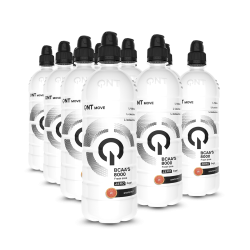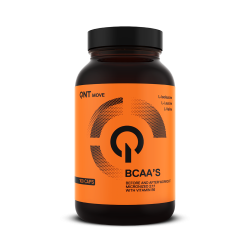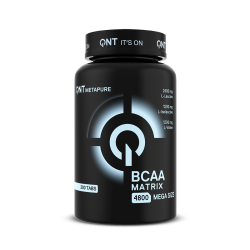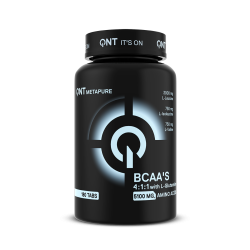BCAA's
BCAA's or Branched Chain Amino Acids are what are commonly known as essential amino acids, i.e. amino acids which cannot be produced by the body and which the body absolutely needs. They must therefore come from food. Leucine, valine and isoleucine are essential amino acids. There are 9 in all.
There are 5 products.
WHAT ARE BCAA AND WHAT ARE THEIR ROLES?
BCAAs, or branched-chain amino acids, play a crucial role in protein structure. Proteins are made up of a chain of amino acids, but they cannot be absorbed directly into the bloodstream in this complex form. They must first be broken down into individual amino acids, which can then cross the blood barrier.
However, there is an important detail to bear in mind: our body has the capacity to synthesise and transform many amino acids into any other, except the essential ones, which include the BCAAs. So it's crucial to provide your body with the right amount of BCAAs for your goals.
The effectiveness of BCAAs lies in the ratio between the three amino acids: leucine, isoleucine and valine. Let's say you make a balanced mix: for optimum results, you need two parts leucine to one part isoleucine and one part valine. This corresponds to the ratio 2.1.1. However, it is interesting to note that a ratio of 4.1.1 could be even more beneficial. On the other hand, a ratio of 8.1.1 does not seem to offer any significant improvements.
WHY TAKING BCAA?
INCREASED ENERGY AND REDUCED FATIGUE
BCAAs can act as an energy alternative to glycogen during exercise, extending the duration of your sessions and maintaining a high intensity. They also limit the use of tryptophan, helping to increase alertness and reduce the feeling of fatigue.
ACCELERATED MUSCLE RECOVERY
BCAAs play a key role in muscle fibre repair, promoting faster recovery and more significant muscle gain.
Effective recovery allows the muscle to train more frequently and productively. The faster the fibres are repaired, the more the muscle will be able to resume profitable training and the faster it will progress.
- SUPPORT IN THE EVENT OF INJURY
Another advantage of BCAAs is that if you stop training because of injury or lack of time, increasing your BCAA intake will minimise muscle loss. What's more, even without exercise, BCAAs stimulate protein synthesis in the muscles. Maintaining muscle tissue can boost metabolism and limit fat gain when you're not exercising. As a result, they support both muscle growth and the maintenance of mass during prolonged periods of inactivity.
IMMUNE SYSTEM STRENGTHENING
BCAAs stimulate the production of antibodies and lymphocytes, helping to strengthen the immune system.
When you're ill and training, you weaken your body even more. BCAAs are therefore an important aid to faster recovery.
LOSS OF BODY FAT
By promoting muscle growth, BCAAs have a direct impact on your basic metabolism. This translates into an increase in your body's energy expenditure. In other words, as your muscle mass increases, your calorie requirements increase to keep your body functioning properly. This dynamic creates an indirect opportunity to burn fat.
During phases of strict dieting, BCAAs also play a crucial role in preserving muscle mass. This preservation is essential for maintaining a balanced body composition, which has a positive effect on your diet as a whole. In fact, maintaining your muscle mass helps to support your dietary efforts and helps to maintain a harmonious figure.
In short, BCAAs not only stimulate muscle growth, they also act as true guardians of your metabolism and body balance, particularly during periods of calorie restriction. Incorporating BCAAs into your routine can be a wise choice for lasting results.
REDUCED MUSCLE SORENESS AND ANTI-CATABOLIC EFFECT
After intensive training, it's common to feel the after-effects in the form of muscle soreness, which often appears the next day or even the day after that. However, these muscular aches and pains can be alleviated with a proper warm-up.
BCAAs also have an important anti-catabolic effect. When you train, your body undergoes a destruction of muscle tissue, but rest assured, this is to rebuild it better afterwards. However, this training phase induces a powerful catabolic process which alters the muscle fibres. BCAAs intervene here by slowing down this degradation of muscle fibres, which helps to minimise the impact of the catabolic process.
BCAA, FOR WHOM AND WHEN?
Insofar as BCAAs are useful and beneficial for intense training, it therefore seems important to have some available before and during the session. And for better recovery afterwards too.
All athletes who want to improve their performance can use BCAAs. BCAAs are very useful in high-intensity, short-duration and strength sports such as bodybuilding, because they help you recover better, reduce muscle breakdown and stimulate muscle building, but also in long-distance sports to provide alternative energy and enable you to maintain a high intensity for longer. Taking BCAAs during a long-distance effort helps to reduce the degradation of active muscles, minimise the degradation of glycogen stocks and reduce the phenomenon of central nervous fatigue.
What's the difference between BCAAs and EAAs?
EAA are essential amino acids, which means that they cannot be synthesised by the body and must come from food. There are 9 of them: isoleucine, leucine, valine, lysine, methionine, phenylalanine, threonine, histidine and tryptophan.
BCAAs can be found in the EAA. Together, therefore, they are 9 effective combinations of what the body needs. BCAAs are most effective at building muscle, but the body also has other needs.
ADVICE FROM THE COACH
Do you want to make sure you have all the amino acids you need for your body to function properly? If you consume BCAAs with whey, you'll have almost all the essential amino acids.
You could consume BCAAs all day long, so beneficial are their effects. But they are most effective during training. So before each training session, take your BCAAs, take some during the session to reduce fatigue and be effective for longer, and take some afterwards to recover better.
When should I stop taking BCAAs? As long as you're training intensively, there's no reason to stop taking BCAAs. If you stop training, you can always take them to prevent muscle wasting, but is it worth it without a sporting or aesthetic objective?




